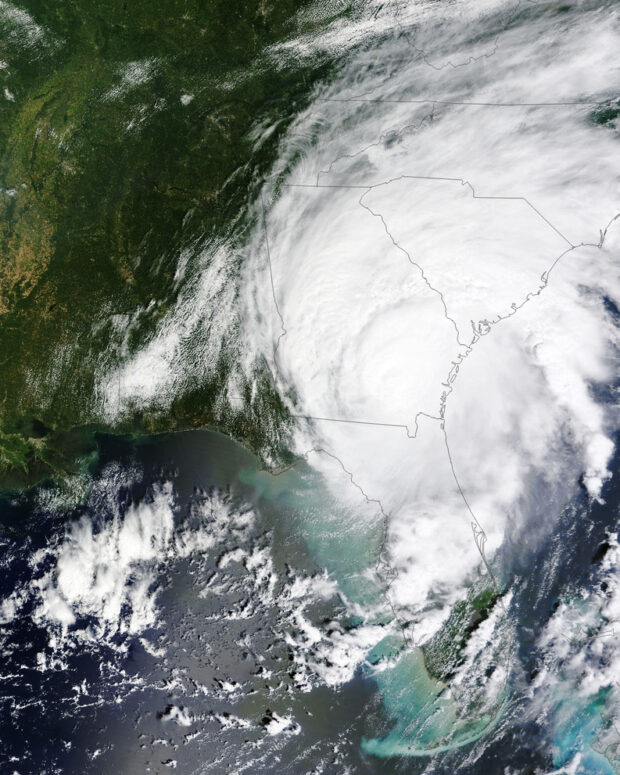Florida-only insurers such as Citizens Property Insurance anticipate fewer losses from Hurricane Idalia than from previous storms in the state, even as industry experts expect further insurer pullback from the market.
Idalia plowed into Florida’s Gulf Coast on Wednesday, leaving three confirmed deaths and forcing dozens of deep-water boat rescues but wreaking less destruction overall than feared.
While Citizens’ preliminary loss projections are not yet available, the insurer projects it will receive fewer than 10,000 claims stemming from Idalia-related damage, a spokesman told Reuters. That amount is far fewer than the 68,000 claims that Citizens received after Hurricane Ian in September 2022.
“Idalia went through a very rural region of the state, missing metropolitan areas in Tampa Bay and Jacksonville,” the spokesman said.
Citizens and other Florida-only insurers were expected to face claims for billions of dollars from the storm, according to a report by Moody’s on Wednesday, adding to a challenging year for the industry that could result in higher premiums for customers.
In Florida, UBS estimated average insured losses of $9.36 billion with a 50 percent chance of losses of over $4.05 billion and a 10 percent likelihood of losses of $25.6 billion, based on Aug. 28 data. The wide range reflected potential changes in the storm’s intensity and path.
Losses will be pushed higher by construction costs, which increased significantly during the pandemic, and a rise in demand for construction labor and materials following the hurricane, Moody’s noted.
The top 10 Florida-only insurers, which provide cover to 44 percent of the state’s homes, are more vulnerable than others given their geographic concentration, Moody’s said.
Despite this, the Insurance Information Institute, an industry research group, told Reuters that insurers’ “adequate levels of reinsurance” makes insurers well-capitalized to pay claims from Idalia.
“This certainly will not help with ongoing challenges to Florida’s insurance market, but it could have been a lot worse,” said Steve Bowen, chief science officer at reinsurer broker Gallagher Re.
Citizens, Florida’s nonprofit, state-backed insurance provider that is seen as an “insurer of last resort,” has been gaining market share since 2022 as primary insurers reduce their exposure to the Florida market.
“As insured values have grown, more of Florida’s risk exposure has transitioned from larger nationwide insurance carriers to Citizens and smaller Florida domestic insurers, placing more strain on the state’s insurance market structure,” Moody’s said in the note.
Regardless, some insurance firms including Farmers Insurance, Bankers Insurance and Lexington Insurance, a unit of AIG, have pulled out of Florida because of the risk of heavy losses, according to a July report in USA Today.
Farmers’ exit would apply “only to policies issued through our exclusive agency distribution channel” and 70 percent of its Florida policies in force would not be impacted, a spokesperson told Reuters via email.
Bankers and Lexington did not immediately return requests for comment.
The top 10 U.S. homeowners insurers such as State Farm and Allstate Corp average only about 4.1 percent of their premiums in Florida, Moody’s said.
The exit of insurers from Florida comes amid a broader pullback from the market, including from reinsurers, according to an Aug. 24 Fitch report.
“Natural catastrophe business has become largely loss-making in recent years as prices have failed to keep pace with increasingly frequent, severe and volatile weather-related losses due to climate change,” Fitch said.
Insurers were hit by losses of up to $53 billion from Hurricane Ian in Florida and South Carolina last year, and industry experts expected insurers to go into bankruptcy and insurance to become less accessible in regions like Florida.
Six insurers became insolvent in 2022, and more than a dozen others either left the state or placed moratoriums on writing new business, Reuters reported in July, citing the Insurance Information Institute.
(Reporting by Noor Zainab Hussain and Manya Saini in Bengaluru and Matt Tracy in WashingtonEditing by Shinjini Ganguli, Megan Davies and Matthew Lewis)





















 Nearly 26.2M Workers Are Expected to Miss Work on Super Bowl Monday
Nearly 26.2M Workers Are Expected to Miss Work on Super Bowl Monday  20,000 AI Users at Travelers Prep for Innovation 2.0; Claims Call Centers Cut
20,000 AI Users at Travelers Prep for Innovation 2.0; Claims Call Centers Cut  AIG, Chubb Can’t Use ‘Bump-Up’ Provision in D&O Policy to Avoid Coverage
AIG, Chubb Can’t Use ‘Bump-Up’ Provision in D&O Policy to Avoid Coverage  Winter Storm Fern to Cost $4B to $6.7B in Insured Losses: KCC, Verisk
Winter Storm Fern to Cost $4B to $6.7B in Insured Losses: KCC, Verisk 




